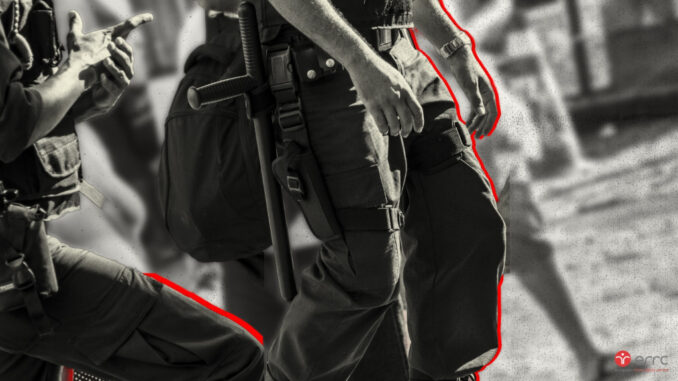
A Slovak civil court has issued an historic first instance ruling in a police brutality case brought by Roma from a community in Vrbnica against the Slovak Ministry of Interior. In a groundbreaking decision, the Bratislava IV City Court ruled in favour of the Romani plaintiffs, marking the first time a civil court in Slovakia has found the police guilty of discrimination based on ethnic grounds. The Romani plaintiffs were represented by Ján Bartánus, attorney-in-law and the European Roma Rights Centre (ERRC) participated as a third-party intervener on behalf of the plaintiffs.
“This is an important and historic victory not only for the plaintiffs but also for any Romani victim of police brutality. It shows that the civil court is an alternative avenue to challenge discriminatory violent conduct because, as we have experienced many times, the criminal proceedings often fail in finding and punishing the perpetrators” said the ERRC’s Slovak Legal Consultant, Michal Zalesak.
The court acknowledged that the police operation in Vrbnica was discriminatory and constituted harassment based on ethnic origin. The court noted that even the way in which the search actions were carried out was discriminatory towards plaintiffs as members of Romani communities. It also held that human dignity of the plaintiffs was violated during the police intervention. As a result, the Slovak Republic, represented by the Ministry of Interior, are ordered to pay each of the six plaintiffs 2,000 euros in non-pecuniary damages. Additionally, the court mandated that the Slovak Republic issue a public apology on its official website for a period of one month. This apology must acknowledge the infringement of the plaintiffs’ personal rights and express regret for the harm caused by the police operation.
“Although, this is a first instance judgment, I’m glad that the victims finally got justice after so many years” said Ján Bartánus, the lawyer who represented the Romani plaintiffs before the court. “In view of the fact that the court accepted the client’s written claim in its entirety, we are satisfied with the outcome of the first-instance proceedings.”
The case centred on one of the infamous police search operations known as ”action code 100,” conducted on 2 April 2015, which targeted Roma living in Vrbnica and other locations within the Michalovce district. During the operation, the Romani residents reported being subjected to aggressive tactics by police officers, including physical force and verbal abuse with racial undertones. Medical reports presented in court documented injuries sustained by the Romani people during the operation, including bruises, contusions, and lacerations. The Court considered these injuries to be consistent with the allegations of physical assault and excessive use of force by police officers during the operation.
Witness testimony, including that of the local mayor, underscored allegations of excessive and inappropriate police conduct. Witnesses described the operation as disproportionately targeting areas with high Romani populations, further supporting claims of ethnic discrimination.
After the police action in Vrbnica, the then Slovak Ombudsperson Jana Dubovcová carried out an investigation into the use of Action Code 100 operations. According to the Ombudsperson´s findings, all the police actions under Action Code 100 in Michalovce district (where Vrbnica is situated) were carried out solely in Romani neighbourhoods. The data gathered by the Ombudsperson also shows that in 2013, 2014, and the first quarter of 2015, the highest number of Action Code 100 raids (259) were carried out in the Prešov region, which has been identified as the region with the largest percentage of so-called “unintegrated Roma” in the Atlas of Roma Communities.
In 2024, some of the victims of the Vrbnica police raid concluded a friendly settlement with the Slovak Republic in the proceedings before the European Court of Human Rights. The friendly settlement referred to the similarity of the case to the infamous Moldava nad Bodvou raid which was carried out under Action Code 100.
The Romani plaintiffs acting before the Bratislava IV City Court alleged that the police operation violated their personal rights and the principle of equal treatment, constituting harassment, direct and indirect discrimination based on their ethnic origin. The judgment ruled in favour of the Romani plaintiffs on all counts. This ruling sets a significant legal precedent in Slovakia, reinforcing the country’s rule of law where it concerns systemic discrimination and upholding the rights of marginalised communities. The Ministry of Interior have appealed the judgment.
This press release is also available in Slovak.
redaktionen@dikko.nu
Att vara en oberoende tidning kostar pengar därför använder vi oss av crowdfunding. Det innebär att människor med små eller stora summor hjälper till att finansiera vår verksamhet. Magasin DIKKOs insamlingen sker via swish: 123 242 83 40 eller bg: 5534-0046
Vill du annonsera eller sponsra, synas eller höras i våra media?
Kontakta oss på redaktionen@dikko.nu
eller ring 0768 44 51 61
IBAN: SE19 9500 0099 6042 1813 4395
BIC: NDEASESS




